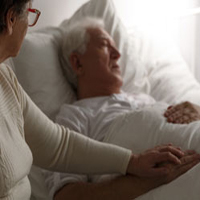Bedsores and Ulcers Signs of Neglect
May 3, 2018 Sending an elderly relative to a nursing home can be a difficult and emotional decision, both for the patient and the family members. Ideally, the nursing home facility that you have chosen will have a skilled and compassionate staff that will provide a safe and nurturing environment for your loved one. There are some facilities, however, that focus more on profit than on providing the best patient care, which can lead to instances of neglect and abuse. One of the common signs of nursing home neglect is pressure sores, also known as bedsores.
Sending an elderly relative to a nursing home can be a difficult and emotional decision, both for the patient and the family members. Ideally, the nursing home facility that you have chosen will have a skilled and compassionate staff that will provide a safe and nurturing environment for your loved one. There are some facilities, however, that focus more on profit than on providing the best patient care, which can lead to instances of neglect and abuse. One of the common signs of nursing home neglect is pressure sores, also known as bedsores.
A nursing home patient can develop bedsores if they are not moved frequently or examined for signs of skin irritation. Sustained pressure restricts blood flow, which deprives the skin tissue of oxygen. Elderly patients are particularly susceptible to bedsores because their skin is more fragile, and they are often unable to move or change positions without assistance. Diabetic patients are also at risk for skin breakdowns because of the circulation issues associated with diabetes. Bedsores are most commonly seen on the coccyx, tailbone, hips, elbows, heels, and shoulder blades.
Bedsores Are a Serious Health Issue
With proper monitoring, movement, and skin care, bedsores are preventable. Unfortunately, when nursing home staff neglect their patients’ basic needs and fail to provide the proper care and treatment, bedsores become a common problem. In fact, nursing home patients suffer from bedsores twice as often as hospital patients. Unfortunately, nursing homes are not required to have the same nurse to patient ratio as hospitals do. Therefore, caregivers are often responsible for many patients, which means elderly residents are often forced to wait long periods of time before they receive the care they need. As a result, patients may be forced to remain in soiled clothing or bed linens for hours. These wet, urine-soaked clothes or sheets can cause the skin to weaken, making the patient more susceptible to bedsores.
If left untreated, bedsores can become a serious health concern. They can develop quickly from a stage 1 pressure sore to a stage 4 pressure sore, which can result in tissue death, as well as damage to the muscle, bone, tendons, and joints. An advanced bedsore is a large, deep, open wound and will reveal bone and connective tissue. Bedsores are the underlying cause of fatality for thousands of patients in this country every year. This type of neglect occurs too often in nursing homes across the country. Your loved one deserves compassionate, quality care from their nursing home staff.
Baltimore Medical Malpractice Lawyers at LeViness, Tolzman & Hamilton Seek Justice for Victims of Nursing Home Abuse
If your loved one has suffered from bedsores or any other form of abuse or neglect as a resident of a nursing home, contact the Baltimore medical malpractice lawyers at LeViness, Tolzman & Hamilton. We are committed to protecting the rights of those who may not be able to protect themselves, including the elderly. We will hold the negligent parties accountable for their actions and seek the maximum financial compensation you and your loved one deserve. To schedule a free, confidential consultation, call us today at 800-547-4LAW (4529) or contact us online.
Our offices are located in Baltimore, Columbia, Glen Burnie, and Towson, allowing us to represent medical malpractice victims in Maryland, including those in Anne Arundel County, Baltimore County, Carroll County, Harford County, Howard County, Montgomery County, Maryland’s Western Counties, Prince George’s County, Queen Anne’s County, Southern Maryland, and the Eastern Shore, as well as the communities of Catonsville, Essex, Halethorpe, Middle River, Rosedale, Gwynn Oak, Brooklandville, Dundalk, Pikesville, Nottingham, Windsor Mill, Lutherville, Timonium, Sparrows Point, Ridgewood, and Elkridge.






